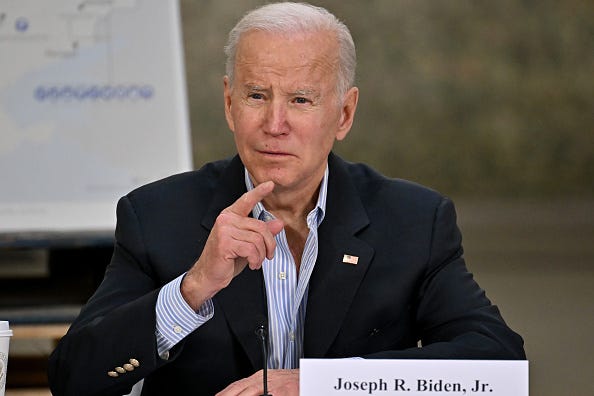After expulsion, welcome
Some Ukrainian-Polish history, and some ways to help refugees in Poland
Yesterday in Poland, President Biden visited Ukrainian refugees in the Polish city of Rzeszów. More than two million Ukrainians have been welcomed in Poland. I cannot recall a case where so many refugees have been admitted so quickly by any one country.
Commentators sometimes overlook a historical dimension of Poland's welcome, presuming that Poles and Ukrainians have always had unproblematic relations. The site of President Biden's visit, Rzeszów, reminds me of how untrue that is.
It was not so long ago that a Polish (communist) government was creating Ukrainian refugees, in the name of the very city Biden visited. In 1946 Polish authorities organized a military operation group called "Rzeszów," tasked to deport all remaining Ukrainians from Poland. About a quarter million people were classified as Ukrainians and forcibly deported to the USSR in three months. Roughly a thousand people died in that "Operation Rzeszów."
The next year Polish communist authorities, realizing that some Ukrainians still remained, scattered more than a hundred thousand people in northern and western Poland, with the intention that they would assimilate. Their aim was "to resolve the Ukrainian problem once and for all." This, and the wartime violence between Ukrainians and Poles that preceded it, are a subject of my book The Reconstruction of Nations*.
Thus the resonance of a visit to Rzeszów is deeper than we might at first recognize. A symbol of expulsion of Ukrainians has now become a symbol of their welcome.
Although the Polish state has taken important steps to allow Ukrainians to enter Poland, it is Polish citizens who have done the hard work. I would guess that most of them have some knowledge of the difficult history between Poland and Ukraine, and that many have families who were touched by it.
So one can read in the extraordinary good will shown by Poles to Ukrainians a way of dealing with history, one that is less headline-grabbing than the perversions on offer from the Kremlin, but perhaps more worthy of note.
I offer today a short list of trusted Polish NGOs that have been hard at work helping Ukrainian refugees. Please consider making a donation to one or more of them. Then you are taking part.
Fundacja Ocalenie, and their donation page
Polish Humanitarian Action, and their donation page
Club of the Catholic Intelligentsia, and their donation page
If you are willing to go to the extra trouble of making a bank transfer, Borderlands Foundation and Homo Faber would also be excellent choices. Homo Faber also has PayPal.
*It seems to be out of print, but you can find Reconstruction of Nations on Kindle. Yale University Press, its publisher, has made electronic versions of number of pertinent books available free of charge for a couple of weeks, including Ukrainian Night, which treats Ukrainian-Polish relations and gives a sense of why Ukrainian self-organization has been so impressive in 2022.






The Ukrainian Night is one of the books I gave to friends after Trump was elected, as a way of encouraging-giving courage. Once again the Ukrainians are showing us what courage looks like. And the history of Ukrainian-Polish relations and what is happening now give me hope that more transformation is possible. The future is not fixed-this moment proves that, in so many ways. Thank you and Dr. Shorr for helping me see that.
Thank you Professor Snyder. I am just back from volunteering in Medyka and Krakow and the Polish people have indeed been an inspiration for all nations.